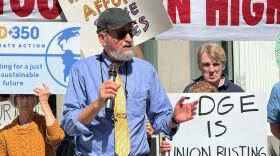A San Diego ballot measure to set aside funds to fix roads and other infrastructure moved one step forward Wednesday. The City Council's Infrastructure Committee voted 3-1 to send it to the full council.
Councilwoman Marti Emerald, who cast the "no" vote, said the measure needs further study and asked that it return to the committee before advancing to the council.
Councilman Mark Kersey proposed the measure last week. It would set aside money from sales tax growth and pension savings to pay for infrastructure improvements, including streets, sidewalks, parks and recreation facilities, libraries, and police and fire stations.
Overall, the measure will capture "a few hundred million dollars" in five to 10 years and $4 billion to $5 billion in 30 years, Kersey said.
City staffers said Wednesday the city is facing a $1.4 billion funding gap between fiscal 2017 and 2021. The gap reflects what the city needs to repair fire stations, streets, and parks and recreation facilities, and the money it takes in.
Kersey said Wednesday that the measure can’t fix everything but is the best approach.
"I think a lot of people were hoping we’d come out with something to solve the entire crisis in one measure, and I just don’t think that’s realistic," he said. "If you look back at the fiscal crisis, the pension crisis, there were multiple votes the public required for each of those to get our arms around the full extent of the problem."
The City Attorney's Office will now work to prepare ballot language for the measure, and the Independent Budget Analyst's Office will study the funding proposals.
The measure would change the City Charter, which acts as the city's constitution, to require future city leaders to dedicate money from three funding sources to infrastructure. Those are:
• Future growth in sales tax revenue over the next 30 years.
How this would work is that any additional sales tax revenue over 1 percent would go for infrastructure projects. Kersey estimates this would net the city $3 billion to $4 billion over 30 years if the economy continues on its current trajectory.
• Future savings from pension reform over the next 30 years.
The plan would set aside pension savings from a measure voters approved in 2012.
Kersey said current predictions are that in 12 to 15 years, the city’s pension liability will drop. He wants to dedicate those savings — he estimates them at $1 billion to $2 billion — to infrastructure fixes.
• Half of all new major general fund growth over the next 10 years.
Current predictions are that this would dedicate an extra $150 million to infrastructure over 10 years, Kersey said.
Mike Zucchet, general manager of the San Diego Municipal Employees Association, which represents white-collar city employees, spoke at the Wednesday meeting and said he's in favor of setting aside pension savings for infrastructure, but thinks the other two facets of Kersey's proposal "seem a bit aggressive."
Zucchet, a former city councilman, said "locking away" funds from general fund and sales tax revenue growth could put future city leaders in a bind if they need the money.
Kersey had considered a sales tax increase but decided instead to pursue a ballot measure that won't raise taxes. Because it would change the city's charter, it will need voter approval, but not the two-thirds voter approval a tax bump requires.
The San Diego Association of Governments, a regional planning agency, is exploring a countywide sales tax increase in 2016 for infrastructure projects. The increase would need two-thirds of county voters to approve it.
Emerald is also pushing aproperty tax increase to build new fire stations.
The City Council will discuss next month whether to put the infrastructure ballot measure on the June ballot.






